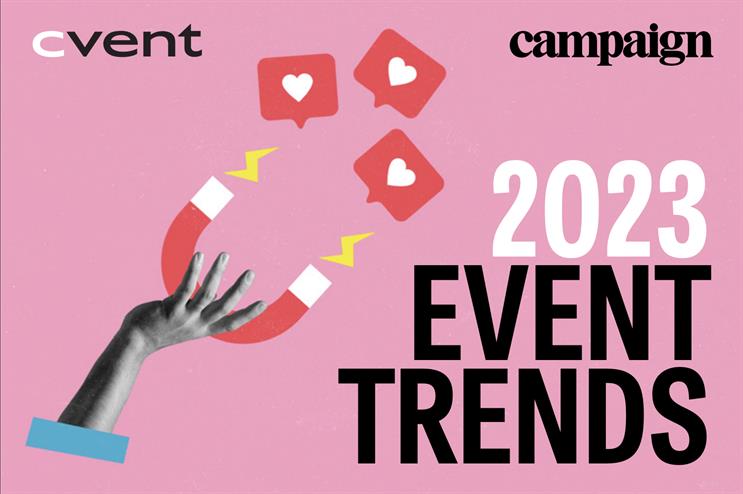
Effective marketing requires a deep understanding of your audience. So it goes without saying that brands should aim to channel their inner Leonardo Da Vincis to create precise portraits of their potential customers.
The best way to build in-depth, accurate buyer profiles? Data, of course. But not only must marketers arm themselves with a plentiful supply of data, they also need access to the right data, and the right strategy to take meaningful action.
Step forward, events. The accelerated digitisation of events post-pandemic has transformed events into an incredibly data-rich marketing channel. With this comes massive opportunity.
And yet, one of the biggest challenges for marketers is capturing the right event data to measure and communicate ROI. Data silos, manual processes and fragmented technology can obscure the reality of the interest of a prospect or customer, and lead to slow or ineffective follow up. Similarly, a lack of standardised processes can lead to inconsistent data, as well as issues with integration across marketing channels.
Here are three steps to help you use event data to measure the effectiveness of your event, prove ROI to stakeholders, and build a clearer profile of buyer interest.
Step 1: Identify the right data
It’s vital to identify the data you want to capture at each event stage. More digital touchpoints has led to more opportunities than ever before to collect data from events. Therefore, digital interactions should be plotted throughout the attendee journey: pre-event, at the event, and post-event.
A recent Forrester report emphasises that too many brands are missing out pre- and post-event metrics, with only 48% capturing pre-event ad clicks and 35% measuring post-event asset engagement. Simply, capturing behavioural data as attendees move through your event will give you deeper insights, and make the event more measurable and quantifiable.
So, what type of data should you be collecting at each stage of your event?
Pre-event, your registration process is an excellent opportunity to capture the contact and industry information of your attendees, as well as the reasons why they’re attending. This will give you insight into whether you’re hitting the right audience and delivering the right offers at your event.
During the event you can capture data to better understand your attendees’ interests and behaviour. For example, you can track the sessions they attend, the booths they visit, and the interactions they have. This data will allow you to refocus future events for maximum impact.
Post-event opens up the opportunity to keep attendees engaged through event surveys, on-demand sessions, and content assets such as videos. This will generate data that will allow you to analyse the attendee experience in full, understand their follow-up preferences, and build a picture of their interests to inform future event content. 
Step 2: Capture it consistently
So you’ve got all the data you need. Great! But, also, bad! You can have too much of a good thing, and data is no exception. You may have all the data in the world, but if you don’t know what you want to learn from it, and how to capture it consistently and correctly, it’s of no use.
That’s why it’s critical to standardise your data capture sources and ensure you are capturing data consistently across all of your event types and formats.
For this, consider the tools you’ll need. CRM and marketing automation systems are, of course, essential because they provide a single source of truth for prospect/customer information and ROI attribution.
However, one of the great things about events is that they generate their own unique data. This helps to build complete profiles of your buyers, but it also means that you will need to use the right event tech to capture your attendee and engagement data.
Here are just some of the ways event tech can help you capture the right data:
- Registration tools: Use this to collect key information about your attendees.
- Onsite check-in & badging: By capturing data from attendee check-ins, printed RFID name badges, and walk-ins, these tools can provide a more in-depth understanding of how attendees are engaging with your event.
- Mobile event apps: A mobile event app is an essential tool for capturing data from polls, appointments set, meetings and sessions attended, and more. You can use this data to deliver personalised experiences and boost engagement.
- Surveys: Post-event surveys can help you capture the Net Promoter Score, feedback about your sessions and content, and help complete the attendee profile.
Step 3: Take action
You’ve got the data you need, and you’ve identified and captured it using the right tech. But that data still isn’t valuable unless you have a joined-up strategy across all marketing channels to take action.
A successful strategy will mean having the right integrations in place to ensure that data can flow between your different martech systems. A robust event tech platform should be able to seamlessly integrate with the rest of your martech to provide you with a true, complete picture of your attendees.
Once you have the data from all of your event touchpoints, you can then assess the engagement of your attendees by building an engagement score. You can then prioritise leads based on engagement, getting hot leads quickly to your sales team for follow-up and getting warm leads to marketing with enough qualification data to enable relevant nurturing. And, hey presto, you’ve accessed the holy grail of attributing pipeline and revenue to your events.
A clear path to maximising ROI
Events are a data-rich channel for marketers, but being able to sift for the right data is critical. By identifying the right data you want to capture at each event stage, standardising and automating the data capture, and integrating your CRM and technologies, you can gain a true, complete picture of your attendees and measure the ROI of your events.
Want to find out more about maximising data and nailing your event marketing strategy? Explore here.


